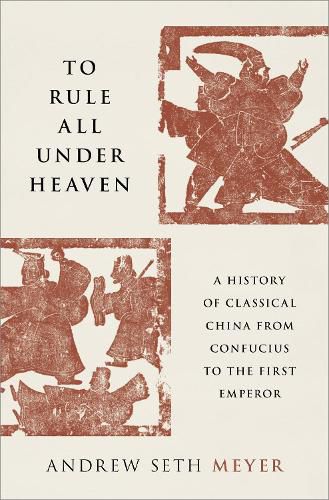Readings Newsletter
Become a Readings Member to make your shopping experience even easier.
Sign in or sign up for free!
You’re not far away from qualifying for FREE standard shipping within Australia
You’ve qualified for FREE standard shipping within Australia
The cart is loading…






The first ever comprehensive history in English of China's Warring States period, an era that saw epic battles, the birth of profound philosophies, groundbreaking innovations, and shaped much of East Asian culture as we know it today In 481 BCE, ancient China was on the cusp of one of the most profound revolutions any society has ever undergone, one that would set the course of world history for the following two millennia and a half. The ruling order that had been set up by the Zhou kings almost six centuries before was disintegrating. While the Zhou realm was populous, wealthy, and blessed with a sophisticated and already ancient culture, the basic institutions that structured social and spiritual life were in radical decay. The world was literally falling apart. The following two-hundred and sixty years saw the largest civilization on earth reinvent and recreate itself. Through war, diplomacy, debate, commerce, philosophy, literature, science, and artistic expression, the people of the Warring States gave birth to a radically new social order. The era saw the emergence of Confucianism and Daoism, the composition of seminal texts such as The Art of War by Master Sun and the Book of Changes, and the codification of Chinese script into its current form. It also saw the initial building of the Great Wall and the canal system that would become the Grand Canal, as well as the invention of the crossbow--which would not be invented in Europe for another 1,500 years--and the origin of acupuncture and feng shui.This dynamic period coincided with the lives of global figures such as the Buddha, Socrates, and the prophet Ezra, beginning during Confucius's lifetime and culminating with the reign of the First Emperor, whose tomb is famously guarded by the terra cotta soldiers. The Persian Wars and the conquests of Alexander the Great are well known to people in Europe and America; however, far fewer English-language books have attempted to cover this same and equally important period in East Asia. To Rule All under Heaven corrects this imbalance by recounting a detailed history that is replete with dramatic stories and characters. The result is a thorough and entertaining account of one of the most fertile and significant periods in world history.
$9.00 standard shipping within Australia
FREE standard shipping within Australia for orders over $100.00
Express & International shipping calculated at checkout
Stock availability can be subject to change without notice. We recommend calling the shop or contacting our online team to check availability of low stock items. Please see our Shopping Online page for more details.
The first ever comprehensive history in English of China's Warring States period, an era that saw epic battles, the birth of profound philosophies, groundbreaking innovations, and shaped much of East Asian culture as we know it today In 481 BCE, ancient China was on the cusp of one of the most profound revolutions any society has ever undergone, one that would set the course of world history for the following two millennia and a half. The ruling order that had been set up by the Zhou kings almost six centuries before was disintegrating. While the Zhou realm was populous, wealthy, and blessed with a sophisticated and already ancient culture, the basic institutions that structured social and spiritual life were in radical decay. The world was literally falling apart. The following two-hundred and sixty years saw the largest civilization on earth reinvent and recreate itself. Through war, diplomacy, debate, commerce, philosophy, literature, science, and artistic expression, the people of the Warring States gave birth to a radically new social order. The era saw the emergence of Confucianism and Daoism, the composition of seminal texts such as The Art of War by Master Sun and the Book of Changes, and the codification of Chinese script into its current form. It also saw the initial building of the Great Wall and the canal system that would become the Grand Canal, as well as the invention of the crossbow--which would not be invented in Europe for another 1,500 years--and the origin of acupuncture and feng shui.This dynamic period coincided with the lives of global figures such as the Buddha, Socrates, and the prophet Ezra, beginning during Confucius's lifetime and culminating with the reign of the First Emperor, whose tomb is famously guarded by the terra cotta soldiers. The Persian Wars and the conquests of Alexander the Great are well known to people in Europe and America; however, far fewer English-language books have attempted to cover this same and equally important period in East Asia. To Rule All under Heaven corrects this imbalance by recounting a detailed history that is replete with dramatic stories and characters. The result is a thorough and entertaining account of one of the most fertile and significant periods in world history.